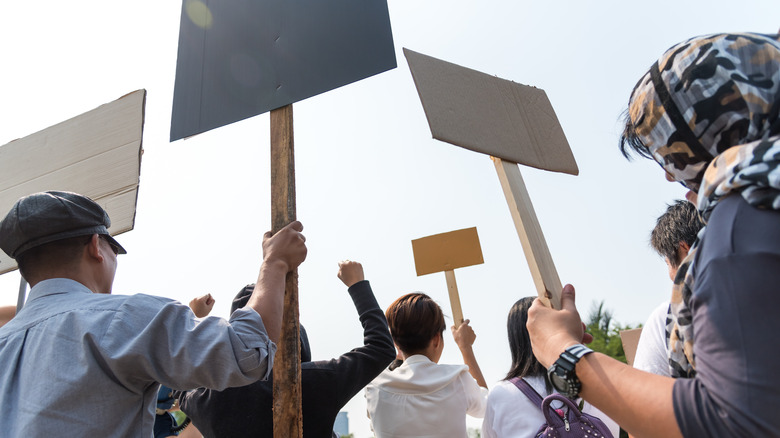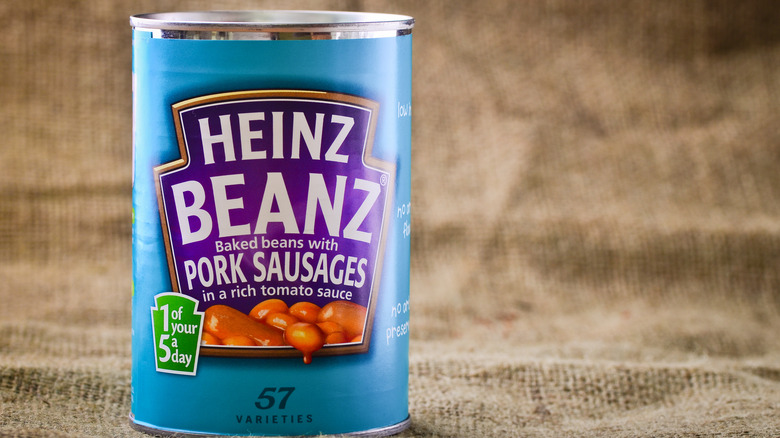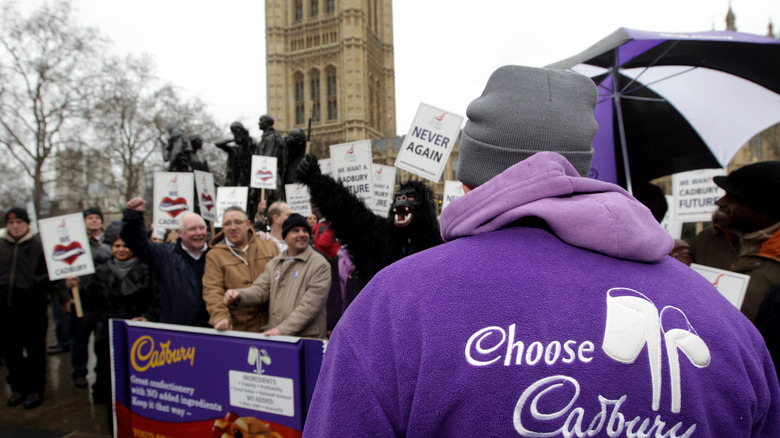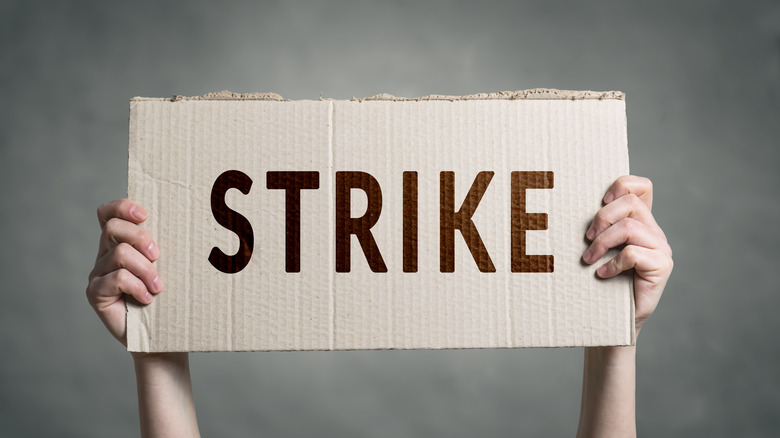The Long History Of Kraft Heinz Employee Protests
It's no secret that, in the United States, workers are starting to demand better pay and working conditions. After the job losses and heightened risks associated with working during the COVID-19 pandemic, employees are not necessarily so keen to get "back to normal." This seems to hold true across quite a few industries, and the food industry is no exception. While restaurant workers are certainly demanding better conditions, so are the people who make the foods we often use to stock our pantries and fill our fridges.
It shouldn't come as a surprise, then, that Kraft Heinz, the fifth-largest food company in the world, is facing some serious employee protests. But this sort of unrest didn't necessarily start with the pandemic. As it turns out, there have been plenty of employee protests directed at Kraft Heinz in the past, sometimes in response to sketchy or downright unethical behavior on the company's part. At these junctures in the company's history, workers have attempted to assert their rights to get the treatment and payment they deserve, sometimes with dramatic results.
As employers and workers continue to re-write the script of what work looks like post-pandemic, we wanted to take a look back at the surprisingly long history of Kraft Heinz employee protests. Why have they happened, and what can they predict about the future of the company ... and of food companies in general?
1975: Violence at a Pennsylvania plant
Perhaps some of the most shocking protests in Kraft's history (and certainly before it merged with Heinz) happened in 1975 in Fogelsville, Pennsylvania. The unrest began amidst the formation of a union of company employees, who were insisting on better wages and working conditions. The union advocated for a raise in wages, but Kraft didn't approach the conversation in "full faith," according to detractors. So, union workers voted to begin a strike on January 19, 1975, according to The Morning Call. This strike lasted for a whopping five months before things got even more serious and outright violence broke out.
After months of protests, the Kraft plant announced that they would be resuming production despite the fact that workers were still on strike. On June 30, tensions between the plant and strikers came to a dramatic head. The plant manager's car was reportedly burned by supervisors that day, and two suffered minor injuries. Firecrackers were being set off, and only one employee was successfully able to enter the plant after passing picketers and a scattering of nails left in the plant's entrance.
Eventually, state troopers and even Pennsylvania's governor got involved. A month later, Kraft agreed to settle on a one-year contract, which finally placated union employees.
2009: Argentina H1N1 protests
COVID-19 may be the pandemic that's currently making headlines, but it wasn't that long ago that the world faced a different pandemic: swine flu, also known as H1N1. It didn't shut down the world as COVID did, but according to the Business and Human Rights Resource Centre, it still led workers in Buenos Aires, Argentina to protest for updated health measures. These included additions like paid maternity leave, which was not offered at the time. In response, Kraft fired 160 workers in August of 2009. The disenfranchised workers then took control of the plant.
On September 25, 2009, police forces removed the workers from the building in what the Business and Human Rights Resource Centre called an "attack." According to Labor Notes, 65 people were arrested at this time, while 12 individuals were injured. Even worse for Kraft's reputation, the whole thing was broadcast on television. Reportedly, the company then used its factory as a detention center for workers, which is against the law in Argentina. Company representatives were also accused of barring the entry of union delegates into the plant. This is also considered a crime in Argentina.
If Kraft Heinz (which was just Kraft at the time) would have listened to their employees' pleas for better working conditions, they may not have faced the chaos that ensued during this incident. Over 10 years later, the episode is still a scar on the company's legacy.
2010: Heinz factory protests in the UK
But Kraft wasn't the only one to experience factory protests before the merger of Kraft Heinz in 2015. In 2010, Heinz factory workers protested in the UK after union pay raise offers were not accepted by the company. These protests, according to The Guardian, took place over a series of weeks, and they each lasted for whole 24-hour periods. While workers said that they liked their jobs and ultimately didn't want to damage the company, they also felt that their pay was unacceptable. In a move that further angered employees, some managers got raises ahead of them, even though lower-ranking workers believed that they were doing more actual work for the company. As one protester said, "We are the people running the machines and we are getting nothing."
A union officer told The Guardian that "The company is shamefully trying to smear this workforce as grasping for more cash even though, year on year, they have worked extremely hard to deliver whacking great profits for Heinz. With Heinz's profit margins extremely healthy at 37%, the workers rightly feel that the company is vastly wealthy and can easily afford to help them meet the spiraling costs of living." Later talks proved difficult, the BBC reports, as a 3.4% pay raise and a £200 bonus were rejected when workers said the offer wouldn't keep up with the cost of living.
2010: UK protests amidst Kraft takeover of Cadbury
In 2010, Cadbury (you know, the company responsible for some of your favorite Easter candy basket stuffers) decided to accept an offer from Kraft Foods to take the reins of the operation for £11.5 billion, according to the BBC. Before the takeover took place, workers and unions worried that employees might lose their employment in the wake of the transition. There were about 4,500 Cadbury workers in the UK at the time, so a significant number of jobs were hanging in the balance.
That's when Cadbury workers decided to stage a protest outside of Cadbury's factory in Bournville. Members of the UK Parliament even got involved, pressuring the government to ensure that Cadbury workers would keep their positions despite the takeover. One MP from Birmingham asked the prime minister how he would keep his promise that the government would do "everything it can to make sure that jobs and investment are maintained in Britain."
Ultimately, though, the takeover went ahead and Kraft (now Kraft Heinz) gained control of Cadbury. According to The Independent, Kraft originally claimed that it would abide by Fairtrade agreements, which stipulated that cocoa producers must be paid a minimum price (Ben & Jerry's recently announced higher payments for its cocoa suppliers for just this reason). However, Kraft later revealed that it would no longer honor this agreement, raising questions about the company's motives and whether it would eventually pull out of the UK entirely for the right price.
2017: Wisconsin Oscar Mayer protests
Kraft Heinz is the parent company of Oscar Mayer and, as much as we may love to see the Wienermobile, it's not all silly cars and hot dogs. In 2015, Kraft Heinz decided to close one of its Oscar Mayer factories in Madison, Wisconsin. The factory in question had been operating for almost 100 years, according to Isthmus. By 2017, Oscar Mayer workers protested, saying Kraft Heinz was failing to honor their exit agreements and contracts. The president of the labor union United Food and Commercial Workers Local 538 told reporters, "They are delaying on purpose. The company is trying not to deal with grievances and other matters, hoping it just fades away. They figure since people are leaving, the union won't go to arbitration or fight this. Oscar Mayer may be leaving Madison, but we still expect the company to bargain in good faith with us."
Problems first arose because workers were supposed to be laid off according to seniority. However, Oscar Mayer began to dismiss employees who had been there longer than other workers. More junior-level employees were allowed to keep their presumably lower-paying jobs for the time being. The union president said that talk of the protest had attracted the attention of Kraft Heinz, which said it would enter into discussions about how to handle the worker grievances. Yet it seemed like the company only cared about following through on its promises when the threat of bad press was held over its head.
2018: Weird Omaha protests
While most of the protests against Kraft Heinz have been staged by workers or unions, there is one protest of the company that looked and behaved a bit differently. It took place in Omaha, Nebraska in 2018 and involved hired protesters dressed in ketchup and mustard bottles. Sound strange? It absolutely was. According to the Omaha World-Herald, these protesters were actually working for a Slovakian billionaire. The billionaire used a service called Crowds on Demand to pay these so-called "protesters" to dress up and demand management changes to Kraft Heinz from billionaire Warren Buffett.
While this may all seem harmless, that's not exactly the case when you consider it in light of the long and complicated history of labor rights. In reality, these kinds of protests can potentially fuel cynicism amongst onlookers, according to John Hibbing, a political science professor at the University of Nebraska-Lincoln. He said, "People are looking around, wondering, 'What can I believe in?' And it seems like something was happening here, and then it really wasn't something. It can only increase cynicism, which is already high."
After the protests and riots of 2020 and 2021, not to mention all the myriad conspiracies surrounding them, it's clear that this sort of cynicism is already here. Who knew that such a silly-looking, innocuous protest of hired actors in ketchup costumes could have such a dark undercurrent?
2021: Black Kraft Heinz workers filed a lawsuit alleging racial harassment
It's not just material working conditions that Kraft Heinz employees are fighting for. Some are simply fighting for the right to basic dignity and respect in their workplaces. That's certainly true of the three Black former Kraft Heinz employees who filed a lawsuit for $30 million against the company for alleged racial discrimination, according to Black Enterprise. The three workers said that they were repeatedly harassed by their fellow co-workers, who allegedly sent them racist notes, used racial slurs against them, and even threatened violence if they didn't quit. The former employees said coworkers also drew swastikas on their lockers and managers gave them more difficult or unwanted work assignments.
These employees reportedly contacted their managers about the ongoing harassment but were told to "keep their heads down, or else they could join the unemployment line." In response, Kraft Heinz told the media that the complaints were several years old and that the company was looking into the incidents. Given the racial reckoning that, for many, came to prominence in 2020 and beyond, this isn't something that can be so easily dismissed. The company is coming under some serious — and warranted — fire in wake of these very serious allegations.







